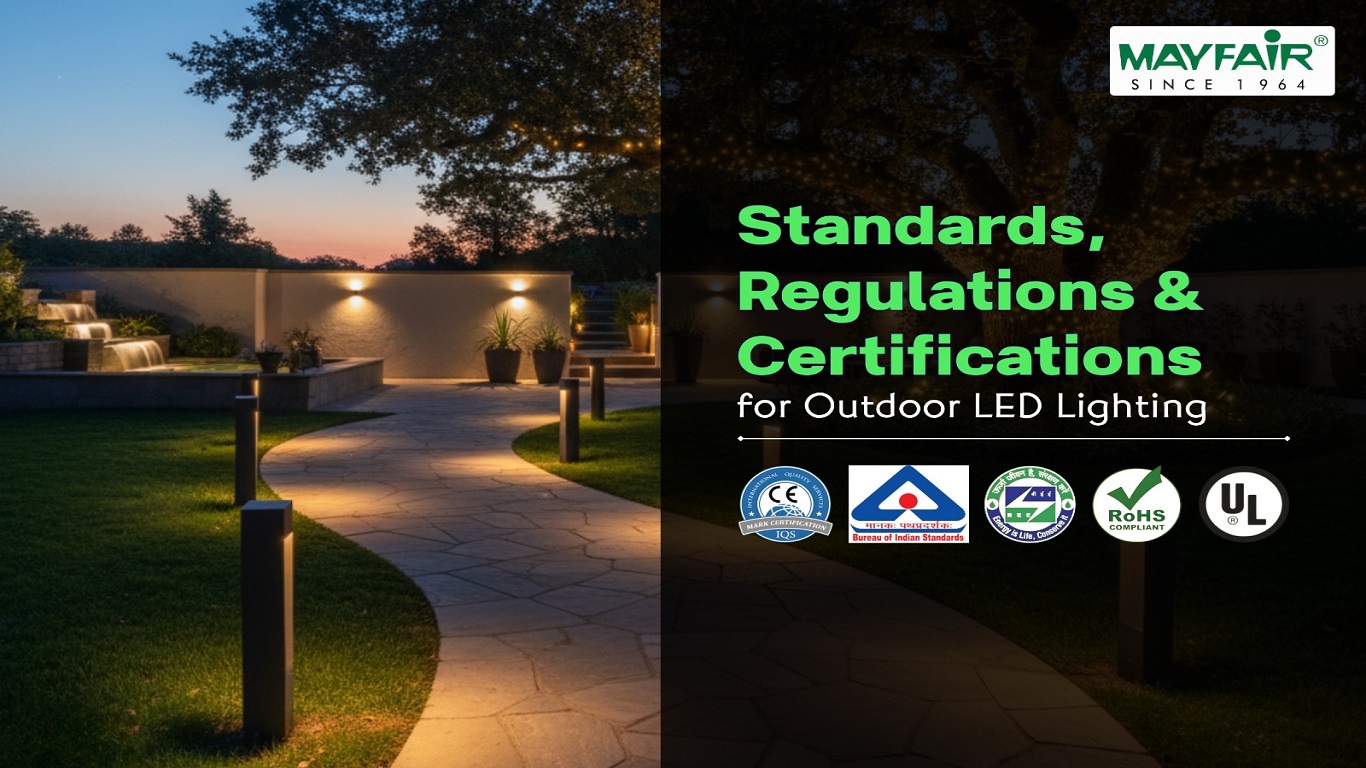
Table of Content
- Introduction
- Why Standards & Certifications Matter
- Key Standards & Certifications in India
- BIS (Bureau of Indian Standards)
- BEE Star Labelling & Energy Efficiency
- LM-79 & LM-80 Testing (IES standards)
- NABL Accredited Labs
- IP & IK Ratings
- ISO Management Standards
- Global Standards & Certifications
- CE Marking (EU)
- RoHS (Restriction of Hazardous Substances)
- UL / ETL (North America)
- DLC (DesignLights Consortium)
- SASO / GSO / GCC (Middle East)
- What We Do at Mayfair Lighting & Poles
- Links & Resources
- Brief FAQ
As outdoor lighting manufacturers, we often hear one common question from customers, contractors, and consultants alike: “How do I know if your LED lights are safe, reliable, and compliant with industry standards?” The answer lies in standards, regulations, and certifications — and we keep our products aligned with the latest national and international requirements.
Why Standards & Certifications Matter in Outdoor LED Lighting
- Safety – Prevents electrical hazards, fire risks, and product failures.
- Performance – Ensures correct lumen output, energy efficiency, and long-term lumen maintenance.
- Reliability – Certified products are tested for weather, dust, water, and mechanical impact to perform in real-world outdoor conditions.
- Government Approvals – Many public tenders and energy-efficiency programmes require specific certifications and lab test reports.
Key Standards & Certifications in India
BIS (Bureau of Indian Standards)
BIS is the national standards body and administers conformity assessment schemes for electrical and electronic products. BIS registration / certification for LED luminaires and related products is central for legal compliance and public procurements.
BEE Star Labelling & Energy Efficiency
BEE's labelling and standards-for-energy-efficiency (lumens-per-watt and other parameters) remain the benchmark for consumer-facing energy ratings in India. Products participating in energy programs or incentives should follow BEE guidance.
LM-79 & LM-80 Testing (IES standards)
Photometric testing (LM-79) and long-term lumen maintenance testing of LED packages/modules (LM-80) are industry-standard test methods used by labs to produce reliable test reports for specification, tendering, and warranty decisions.
NABL Accredited Labs
For legal and procurement purposes, test reports from NABL-accredited testing labs are preferred/required. Manufacturers should use NABL-recognized test houses for LM-79/LM-80, IP, IK and electrical safety tests.
IP & IK Ratings
For outdoor fixtures, IP65 / IP66 (or higher) for dust/water ingress and relevant IK impact ratings are commonly required for durability and public installations.
ISO Management Standards
ISO 9001 (QMS), ISO 14001 (EMS), and ISO 45001 (OH&S) remain relevant for manufacturing quality, environmental performance, and worker safety — helpful when bidding for large projects.
Global Standards & Certifications
CE Marking (EU)
Required for placing products on the EU/EEA market; the CE process and declarations of conformity should be followed for LED luminaires sold into Europe.
RoHS (Restriction of Hazardous Substances)
Restricts the use of certain hazardous materials in electrical/electronic equipment in the EU and similar regimes. Compliance is necessary for many export markets.
UL / ETL (North America)
UL continues to be the leading safety certification route for the US & Canada market for lighting products.
DLC (DesignLights Consortium)
DLC qualification is widely used in the U.S. for performance and to access utility rebates; manufacturers targeting US commercial projects should consider DLC listings.
SASO / GSO / GCC (Middle East)
For exports to the Gulf region, local conformity marks and SASO/GSO rules may apply — check destination-country requirements.
What We Do at Mayfair Lighting & Poles
- Use NABL-accredited labs for LM-79/LM-80 and safety testing
- Maintain BIS registration and supply BIS-conforming products for Indian tenders
- Provide IP/IK ratings and certified test reports with shipments for public projects
- Follow RoHS/CE/UL routes for exports and DLC listing where required


